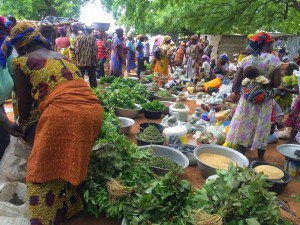The Plight Of The Northern Woman In Ghana
The assertion that the average Northern Ghanaian woman spends about 70 percent of her time on house chores alone cannot be far from the truth as most women in this part of the country are less educated and are mostly not allowed to take decisions that affect their lives for personal development.
Despite the acceptance of modern trends in some societies, it still remains a taboo in various communities for women to acquire property or engage in very lucrative business with the explanation that they were ordained to be caretakers of the kitchen and should be confined there as such.
This is said to have culminated in the lack of interest by most parents to send their female children to school decades ago ostensibly contributing to the problems confronting a greater percentage of women today in spite of the fact that they contribute a lot to the upkeep of their families and communities at large.
In the Northern Region for instance, the number of well educated women is less than men. It is estimated that over 65 percent of women in the region cannot read, write or speak the Queens language as against 68 percent or more men who can read, write and speak the language [Ghana Living Standard Survey].
Due to their inability to receive any form of formal education, most parents thought and still think a girl’s role is in the kitchen or getting married as soon as she attains the status of adulthood. In some cases, girls are abducted and forced into early marriages against their fundamental human rights compelling them to drop out of school. This continues up to a point where the child grow into a matured woman and becomes so ignorant of a lot of issues and is not able to take certain critical decisions even regarding their reproductive health or does not have a say during decision-making.
Yet, it is the insistent belief of women in the area that they have the potential to own their own business enterprises and also have the strong will to grow them to prove their worth in various endeavours, as they are the major source of labour of their societies
A cross section of men who spoke on the matter, maintained that it was out of place to allow a woman to own a business as it was a channel for them to rub shoulders with their male counterparts. Many were of the view that it was to avert these unhealthy competitions they married more than one so that their wives could compete in catering for them though it was supposed to be the reverse.
Contributions of the Northern woman
A 2007 co-relation research by Diamond FM, a Tamale-based local radio station and the Business Advocacy Challenge (BUSAC) Fund revealed that about 40 percent of households in the Northern Region in particular, are headed by women and this is as a result of divorce, widowhood or women being married to irresponsible men. These women arguably, fend for their families through back-breaking jobs including petty trading, peasant farming, selling of charcoal and wood and in extreme cases, beg for alms on the streets of the city.
While their male counterparts lazy around in drinking bars, playing draft under trees/sheds, these industrious women explore every available opportunity to ensure that there is always food on the table for their kids and husbands who do not bother to find out how that food came about which they sometimes eat and criticize. It is not over emphasizing to state that, women go through numerous risks to save the soiling image of their husbands who are continually becoming unproductive in society with the traditional misinterpretation that the man is always the head of the house.
For instance, ActionAid-Ghana estimates that about 60 percent of Ghanaian women engage in smallholder farming with a chunk of the figure emerging from Northern Ghana where women farm to feed their families and also sell some of the produce to pay for their children’s school fees
. Yet, it becomes almost impossible for women to acquire lands for farming because it is the belief of their male counterparts that, women are not supposed to own property as it paves the way for competition between them and men
. Even in situations where lands are released to women for farming purposes, such lands are often taken back after a season leaving the woman with no option than to look elsewhere for another opportunity.
In spite of all the aforementioned contributions of Northern Ghanaian women, most men refuse to support them in their endeavours, thus further compounding their problems. Certain negative traditional practices, cultural misapplications and religious misinterpretations also continue to limit women and tend to sway them in their attempt to grow in business in Northern Ghana in particular as they continue to suffer from male dominance and abject poverty. As tools for economic growth, most men in the area rather see women and young girls as beast of burden by shifting most of the domestic responsibilities to them.
Challenges inimical to development of the Northern woman
Most women of Northern Ghana believe that the institution of marriage poses one of the stiffest limitations to the growth of their business. Some women believe that some men use supernatural powers (juju, in African parlance) or other ways to truncate their wives’ flourishing businesses to ensure their (husbands) hold. Thus, a married woman, who is also a successful business entrepreneur, owning landed property is a rare phenomenon in the region, according to a 2007 co-relation the research conducted by Diamond FM and BUSAC Fund.
The marriage institution, the traditional system of inheritance and the traditional leadership system are the main socio-cultural vehicles over which men in the region do not only have absolute dominance but also are used as denial, exclusion and limitation tools to inhibit the growth of women in many life’s functions.
Sex stereotypes, defining male/female traditional roles which the women themselves, unaware of their rights, readily accept without question is largely responsible for their own inferior portrayal.
While women single parenting and women headed homes are fast becoming the norm rather than the exception in the region, (either they are widowed, divorced or married to poor or irresponsible husbands) they are at the same time denied the right to land, inheritance, credit means, enter the professions or rise in business.
Another challenge is the issue of ‘child brides’ which continue to deny girls the right to education and it feeds into the low Gender Parity Index (GPI) at the basic school level in the area. This phenomenon exists because of poverty and as a result, parents who have their daughters in school but cannot take care of them due to financial challenges are forced to withdraw them from school to marry.
Thus the women are stripped of many skills and capacities in life’s functions. The end result is a cycle of poverty that transcends from one generation to the other in the communities these unfortunate women struggle to make a living.
Educating females has been shown to reduce their fertility rates and to delay when they begin childbearing. In addition, more educated females seek earlier prenatal care when they are pregnant, which lowers maternal mortality. But due to low female education in Northern Region of for instance, only 6 perecnt of women between 15 and 49 years use contraceptives, according to the 2008 Ghana Demographic and Health Survey.
Thus, the number of children between the ages of 1 and 15 constitutes about 47 percent of the total population of the whole region, and about 23 percent of young girls between ages 15 and 19 are already mothers or are currently pregnant.
Currently, the average number of children per every single woman in the region is 6.8 percent representing about 7 children per woman as against the maximum national figure of 4 children per a woman, according to the survey.
Thus, in the Northern Region where many polygamists exist, women with more children are often compelled to take up strenuous jobs in order to take care of their children since most husbands appear to be irresponsible.
The phenomenon breeds domestic violence and endemic poverty in most homes. Sampled views of women regarding the challenges they are confronting with revealed they were reluctant to confront their husbands for fear of being divorced.
They Disclosed that several domestic violence they suffered in hands of their husbands were kept under wraps as exposing them was an antidote for them being branded witches and divorced. Despite their rights being abused, many preferred suffering in secrecy than report to the Domestic Violence and Victim Support Unit (DOVVSU) to have this issued addressed.
Dr Micahel Ayamga, a lecturer at the University for Development Studies concedes DAILY GUIDE findings that women are not recognized in view of the fact that issues are defined on gender lines.
He indicated that, women are as well not paid for the services rendered to their respective families though it is a mandatory requirement for them to be remunerated in order to feel part of the family.
Dr Ayamga bemoaned the perception that women were primarily meant for fulfilling domestic and reproductive obligations. In explaining, he said that such a psyche belongs to those of the stone ages and appealed to men to take up the challenge of complimenting the efforts of their wives who are mostly inundated with house chores than shirk responsibilities with flimsy excuses.
Attempts to Solve Problems
An international non-governmental organization (NGO) ActionAid-Ghana is one of the organizations which is poised to reverse these negative trends to reposition women in their rightful places in modern society. Through a funding support from the Dutch Government, the organisation is currently implementing a project dubbed: ‘Women Rights to Sustainable Livelihoods’ in four districts of the Northern and Upper East Regions of Ghana intended to sensitize communities on unpaid care work and time diaries.
Unpaid care work is imbued in the African and for that matter the Ghanaian society, since the creation of man but usually seen as women’s work. It is defined as work such as caring for mother, father and siblings; working for the community; cooking and fetching water for the family; cleaning and sweeping the home; feeding and bathing children, among others.
According to statistics from the NGO, an average Northern woman spends about 70 percent of her time on house chores or unpaid care work daily, and as a result, majority of them are denied the opportunity to engage in other income-generating activities in order to support their families as well as empower themselves economically.
The organization believes the desire for paid work by many women have led to working a ‘double day’, squeezing leisure time and leading to stress, exhaustion or ‘burnout’ continuously leading to serious implications on their health and their general wellbeing. Care obligations, it says, also create obstacles to women’s full and meaningful participation in the public sphere, making it difficult for them to enter debates at the community level and stand as representatives for local government.
Unfortunately, these issues as highlighted above have gained little recognition from governments and other civil society groups in Ghana. By ignoring unpaid care work in economic analyses, government and the market assume that unpaid care work is more a matter of concern for the household and in particular for women in a household, which is not good for community and family cohesion.
The project is expected to have a trickledown effect on 3000 women smallholder farmers from Talensi, Nabdam, Nanumba North and Nanumba South Districts of the Northern and Upper East Regions of Ghana where it is being implemented. It aims to empower women to demand more public services from local and national authorities to fulfil their basic human rights and support their households to provide better quality care, while saving them time and energy to engage in other activities. Through this process, the project seeks to support women’s individual and collective empowerment.
Speaking during a workshop organized in Tamale to sensitize journalists and local government staff on the project, the Project Manager Ms Azumi Mesuna, explained that it intends to start changing women’s and men’s beliefs that unpaid care work is primarily the responsibility of women and girls and that it is not as valuable as men’s contribution through paid work.
‘In other words, the time has come for men to support women in their house chores so that society can do away with the problem of differentiating roles and responsibilities for men and women as well as girls and boys,’ she emphasized.
According to Ms Azumi, ActionAid has designed this innovative food security and women rights project to provide practical solutions that would reduce the unpaid care work of women smallholder farmers’ as part of a comprehensive approach to improving women farmers’ productivity and household food security and increasing their ability to engage with duty bearers to provide social services that will reduce, redistribute and recognize their unpaid care work.
She urged District Assemblies to ensure that their budgets are gender responsive to the needs of women smallholder farmers’ by increasing budgetary allocation for them to have access to agricultural inputs and reduce the burden of care work that increase their poverty levels.
Various Organizations working for the rights of women are however of the view that if women are adequately supported and negative practices relegated to the background, they would have the opportunity of excelling and becoming more productive than their male colleagues. The big question being asked is; when would the Northern Woman be liberated from the shackles of illiteracy, poverty and abuse of her rights?
Story : Stephen Zoure Tamale





